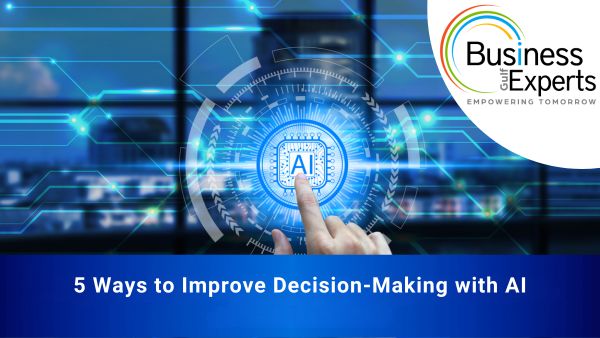5 Ways to Improve Decision-Making with AI
Unlock the Power of AI: Five Ways AI Can Enhance Decision-Making
Making decisions is a key part of running an organization. It affects how successful the organization will be in the future. Good decisions help organizations reach their goals by giving clear direction, using resources wisely, adapting to new situations, managing risks, and staying competitive. They also encourage new ideas and innovation. In short, good decision-making is crucial for handling challenges and taking advantage of opportunities.
But today, making decisions has become more complicated. With so much data coming in from everywhere, organizations need efficient ways to make smart choices. This is where Artificial Intelligence (AI) comes in. AI can analyze large amounts of data, find patterns, and provide useful insights. Here is five ways AI can improve decision-making:
1. Enhanced Data Analysis
AI is great at quickly and accurately processing large amounts of data. Traditional analysis methods are often time-consuming and prone to errors. AI-powered tools can:
- Identify trends and patterns in data.
- Highlight correlations that may not be immediately apparent to humans.
- Generate real-time insights for quick decision-making.
For example, predictive analytics tools use AI to forecast future trends, enabling businesses to stay ahead of the curve.
2. Reducing Human Bias
AHuman decisions are often influenced by cognitive biases, such as overconfidence, anchoring, or confirmation bias. AI systems, on the other hand, rely on data-driven algorithms that minimize subjective influences. By providing unbiased recommendations, AI ensures that decisions are:
- Objective.
- Fair.
- Based on evidence rather than intuition.
For instance, in hiring processes, AI can help organizations identify the best candidates based solely on qualifications and skills, reducing the risk of bias.
3. Improved Scenario Planning
AI can simulate multiple scenarios and predict potential outcomes with high accuracy. This capability allows organizations to:
- Evaluate the impact of different strategies.
- Prepare for potential risks and challenges.
- Make proactive decisions.
For example, in supply chain management, AI tools can predict the effects of disruptions and suggest alternative routes or suppliers.
4. Automation of Routine Decisions
By automating repetitive decision-making processes, AI frees up human resources to focus on more strategic tasks. Examples include:
- Automating approval workflows in finance.
- Streamlining customer support through AI chatbots.
- Optimizing inventory management based on real-time data.
This not only increases efficiency but also ensures consistency in decision-making.
5. Continuous Learning and Improvement
AI systems leverage machine learning to continuously adapt and improve over time. As they process more data, their predictions and recommendations become more accurate. This capability ensures that organizations can:
- Stay competitive in dynamic environments
- Refine their strategies based on evolving insights.
- Benefit from long-term, sustainable improvements in decision-making
Conclusion
- Moreover, AI can help organizations respond more effectively to market changes, improve customer satisfaction, and drive innovation. As AI technology continues to evolve, its potential to transform decision-making processes will only grow. Organizations that invest in AI today will be better positioned to navigate future challenges and capitalize on new opportunities.
- Start exploring AI solutions today and unlock the full potential of data-driven decision-making!









